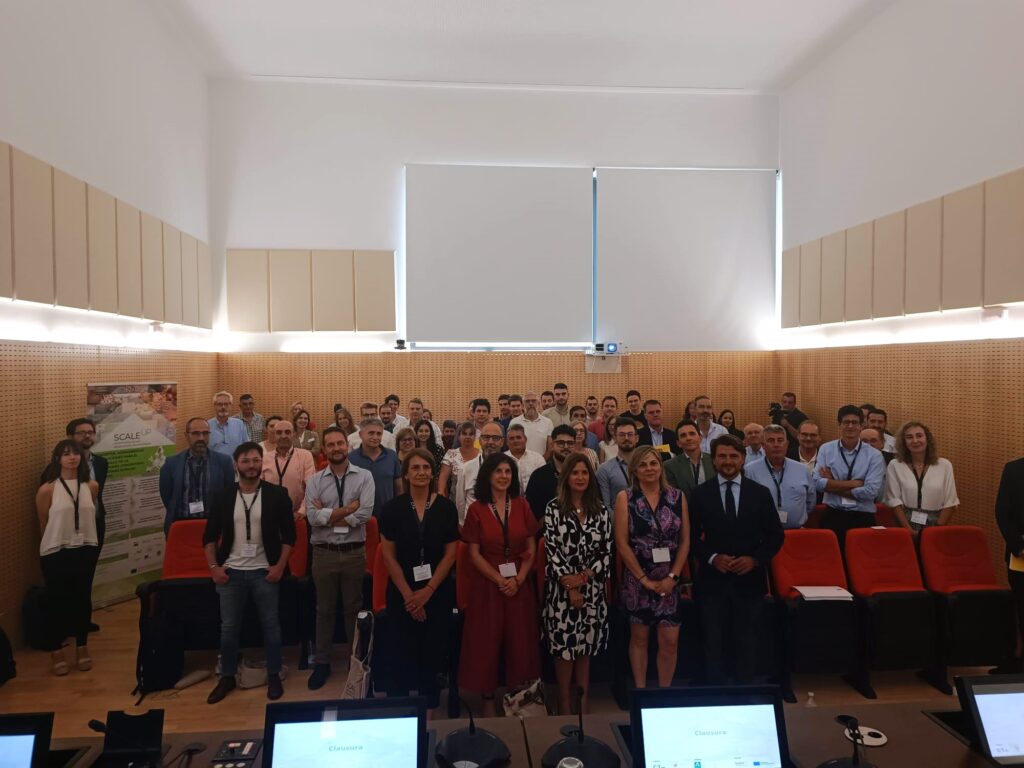
CTA (Technological Corporation of Andalusia)in collaboration with the University of Jaén (UJA), the Andalucía Emprende Foundation and the Circular Cities and Regions Initiative (CCRI), organized the conference “Bioeconomy in the olive sector as a lever for economic and social transformation”, held today at the Escuela Politécnica Superior (EPS) of Linares. The meeting, part of the European SCALE-UP project of which CTA is a partner, brought together more than 80 attendees who analyzed the development opportunities offered by the olive bioeconomy in Andalusia.
The mayoress of Linares, Auxi del Olmo, closed the event and affirmed that the bioeconomy “is going to be one of the engines of development of this century”, so she encouraged to promote it “hand in hand with our companies and through their R+D+i departments, hand in hand with the research groups of the universities and the technological centers, such as CETEMET”. “We are convinced that Linares has to be an innovative city,” stressed the mayoress, who offered the collaboration of the City Council to promote the bioeconomy hand in hand with entrepreneurs, the UJA and all entities working in this field, such as CTA.
For his part, the president of CTA, Beltrán Pérez, highlighted “the great potential in bioeconomy that Andalusia has due to the great availability of biomass” and stressed the need to “look at the olive grove as a source of biological resources, since it represents 30% of the cultivated area in the region, with an undisputed prominent role of the province of Jaén”. Pérez insisted on “the need to cooperate, from the triple helix Administration-Business-Academia, to promote the Andalusian circular bioeconomy because it is a new path or way to produce more sustainable and for its capacity to generate economic growth and employment”.
Also participating in the meeting were Victoria López Ramón, Vice-Rector for Research and Knowledge Transfer of the University of Jaén; and María del Carmen Ortiz, Provincial Secretary General of the Regional Ministry of University, Research and Innovation of Jaén. The Vice-Chancellor indicated that “the future of our society depends on the transfer of knowledge to the productive sector and to society in general and for this to generate value it is necessary to make considerable efforts: public-private collaboration, national and regional support and support from the universities themselves”. He also stressed that the University of Jaén is strongly committed to the bioeconomy in the olive sector, “a strategic sector for our province and a key focus of attention for our institution”.
The program of presentations included the presentation of the “Andalusian Strategy for the Circular Bioeconomy” by the Ministry of Agriculture, Fisheries, Water and Rural Development of the Andalusian Regional Government. In addition, ideas of R&D&I projects related to the olive bioeconomy were shared through the interventions of representatives of the Andaltec Foundation R&D&I Technological Center, Bioliza, Ecogestiona, Smallops and Naturphenolive.
Regarding the opportunities and support mechanisms offered by the European Commission in this area, the meeting included sections dedicated to the Circular Cities and Regions Initiative (CCRI) network, which brings together more than 30 cities, regions and territorial groupings from 18 European countries; and Green Assist, a support mechanism for entrepreneurship to improve investment opportunities in green projects.
A round table on public and private financing opportunities was also held, with the participation of representatives from the Center for Technological Development and Innovation (CDTI), Banco Santander and Austral Venture Gestión.
Exhibition area on agriculture and bioeconomy
After the event, attendees were able to visit an exhibition area of I+D+i projects related to agriculture and bioeconomy, where European initiatives such as Andalucía Agrotech EDIH, BBioNets, ROBIN, SCALE-UP and BIOTRANSFORM, in which CTA participates as a partner, were presented.
This meeting has been organized with the support of the SCALE-UP project, an initiative funded with nearly 3 million euros by the Horizon Europe program of the European Union. SCALE-UP aims to promote the development and scaling of innovative solutions based on the use of biomass in six European regions, including Andalusia with the olive grove.
In fact, the event was attended by members of the Andalusian Bioeconomy Platform of SCALE-UP, a group of more than 40 public and private entities that collaborate with the project in its goal of promoting the regional bioeconomy.

